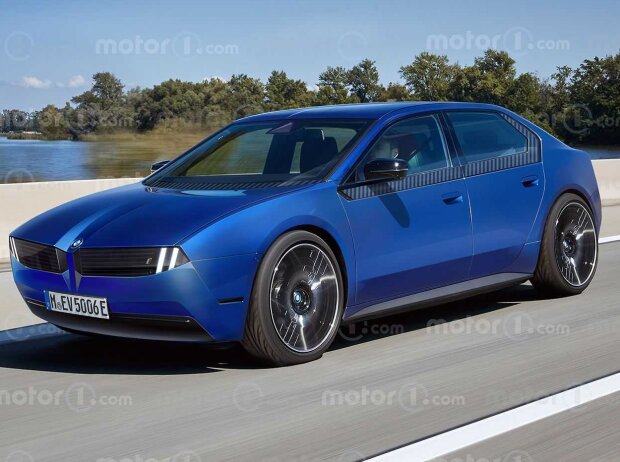The first electric sedan on the New Class platform could be an electric BMW 3 Series – Here is our unofficial rendering
(Motorsport-Total.com/Motor1) – The future of BMW is called “New Class”. The platform will debut in 2025 and will form the basis for all future models from the Bavarian company. The architecture should represent a real revolution for the brand, as it could redefine design, technology and drive efficiency.
BMW New Class: First model rendered by Motor1.com
zoom
The first model of the new BMW era is likely to be a sedan that will be launched in the segment where the 3-series is offered today. What could she look like? Let’s try to imagine this with a first rendering …
The new identity
The inspiration for the first New Class sedan comes directly from the iVision Dee concept unveiled at CES in Las Vegas in January 2023. As futuristic as the study is, it has several solutions on board that could become standard for years to come. Starting with the new “radiator grille”.
BMW has been experimenting with different styles in recent years, from the more traditional 3 and 5 Series, to the more upright grille of the 4 Series, to the very distinctive styling of the 7 Series and X7. It can be assumed that the first BMW of the New Class will have an even more innovative front end with slim LED headlights integrated directly into the grille.
In general, the shapes should be square, although aerodynamics will play an important role. To compensate for this, a lot could be done with active panels and appendages to best combine battery pack cooling with less drag.
Minimalism and new batteries
As with the iVision Dee, the cockpit should be simplified in terms of its functions. While BMW isn’t likely to do away with instrument and infotainment screens entirely, voice and gesture controls are likely to be improved to minimize distraction while driving.
In addition, the Munich brand is to increase its commitment to more sustainable and environmentally friendly covers and fabrics.
Another break with the past is the battery pack, which is intended to take on a structural function for the entire body. The new batteries are said to have a 30 percent higher energy density and 50 percent lower production costs than the current models and have a capacity of 75 to 150 kWh of electricity.
BMW is aiming for a maximum range of 1,000 km. With rear and all-wheel drive and separately excited synchronous motors that achieve an efficiency of 97 percent.
The new class will be equipped with an 800-volt architecture, which according to Frank Weber (Chief Technology Officer of BMW) allows for a high charging speed, so that 48 km of range can be achieved in one minute.
And then there is the issue of power. The platform will support a maximum of around 1,000 kW and up to four electric motors: the perfect recipe for a future high-performance M. But before we see such powerful models, BMW should try to focus on a mass-produced vehicle. And that’s why the possible successor to the 3 Series (always one of the best-selling BMWs in the world) should be the right choice for this fresh start.

